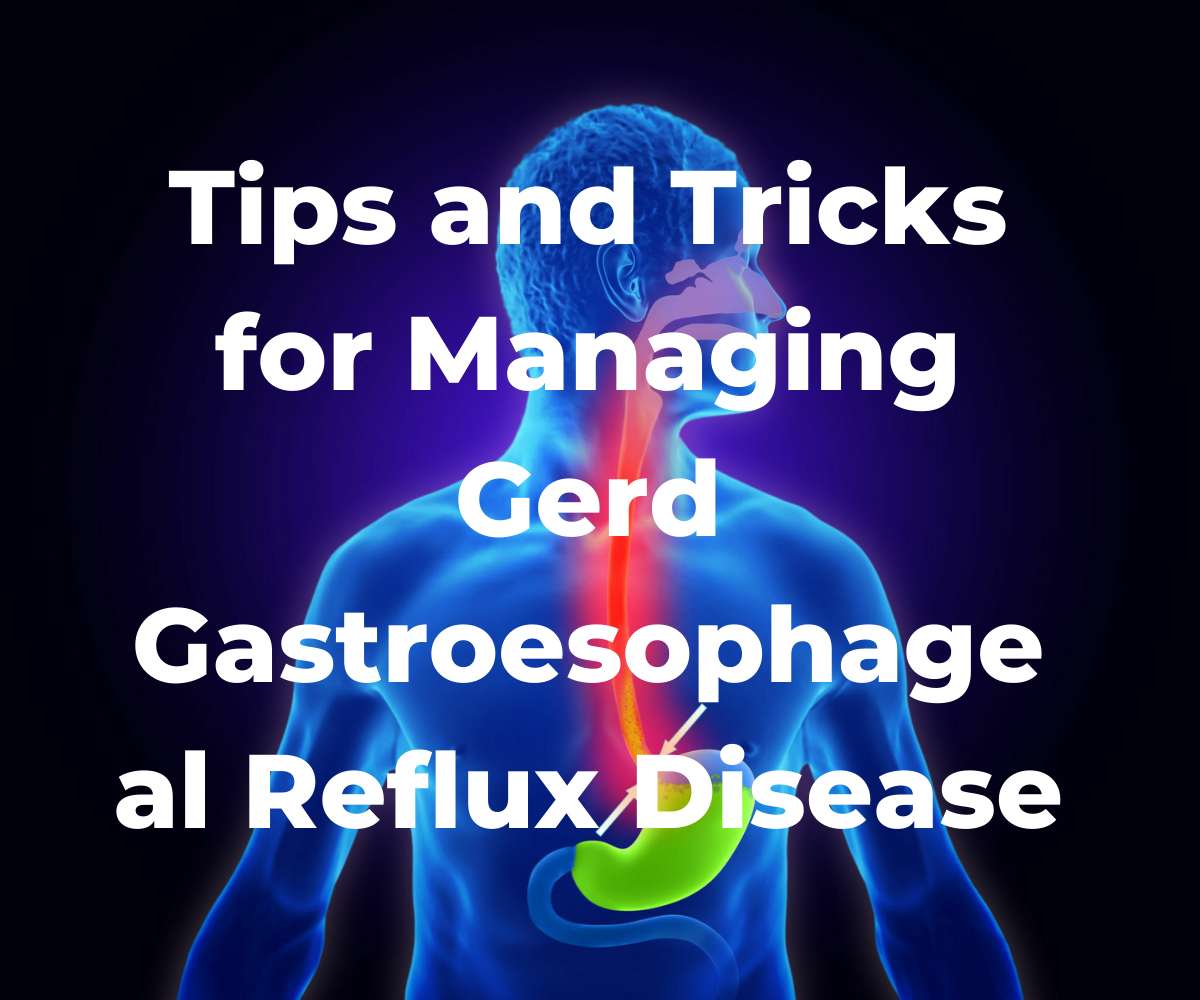
Acid Reflux SOS: Tips and Tricks for Managing GERD
Living with Gastroesophageal Reflux Disease (GERD) can often feel like traversing turbulent waters, with the constant threat of acid reflux disrupting the tranquility of daily life. The persistent discomfort, characterized by the burning sensation known as heartburn, necessitates a proactive and informed approach to regain control over digestive health. With the help of this comprehensive book, people will be able to manage and reduce the symptoms of their GERD and learn useful tips and methods.
Understanding the Enemy: GERD and Heartburn:
Gastroesophageal Reflux Illness, or GERD, may be an incessant condition characterized by the determined backflow of stomach corrosive into the esophagus. While heartburn is a prominent symptom of GERD, it's essential to recognize that GERD involves more than occasional discomfort; it entails a consistent and often daily struggle with acid reflux.
Tip 1: Embrace Lifestyle Modifications:
Lifestyle modifications form the foundation of GERD management. Incorporating these changes can significantly alleviate symptoms and promote overall digestive health:
● Dietary Changes: Identify and avoid trigger foods such as spicy, acidic, and fatty. Choose a eat less wealthy in natural products, vegetables, and incline proteins. Keep a food diary to pinpoint specific triggers.
● Meal Timing: Devour littler, more visit suppers to decrease weight on the lower esophageal sphincter (LES) and minimize the hazard of corrosive reflux. Avoid eating close to bedtime.
● Weight Management: Keeping up a solid weight is vital for GERD administration. Excess weight can exert pressure on the abdomen, leading to increased reflux.
Tip 2: Elevate Your Sleeping Experience:
Nighttime can be a vulnerable time for individuals with GERD. Raising the head of your bed can offer assistance to avoid stomach corrosive from streaming back into the esophagus whereas you rest. Utilize bed risers or an adjustable bed frame to create a slight incline, relieving nighttime reflux.
Tip 3: Choose Your Beverages Wisely:
Beverage choices play a significant role in GERD management. Consider the following tips:
● Limit Caffeine and Alcohol: Both caffeine and alcohol can relax the LES, increasing the likelihood of acid reflux. Choose decaffeinated options and moderate alcohol intake.
● Opt for Water and Herbal Tea: Water and homegrown teas, such as chamomile or ginger tea, are tender on the stomach and offer assistance in alleviating stomach-related distress.
Tip 4: Practice Mindful Eating:
Mindful eating involves:
● Savoring each bite.
● Paying attention to hunger and fullness cues.
● Enjoying meals in a relaxed setting.
This practice can promote better digestion and reduce the risk of overeating, which can contribute to acid reflux.
Tip 5: Investigate Natural Remedies:
While not a substitute for professional medical advice, some individuals find relief from GERD symptoms through natural remedies:
● Aloe Vera Juice: Aloe vera has anti-inflammatory properties and may relieve esophagic irritation. Consult with a healthcare professional before incorporating aloe vera into your routine.
● Ginger: Ginger has been utilized for centuries to relieve stomach related inconvenience. Consider ginger tea or incorporating fresh ginger into your meals.
Tip 6: Manage Stress and Anxiety:
Stress and anxiety can exacerbate GERD symptoms. Investigate stretch administration procedures such as profound breathing, reflection, or yoga to advance unwinding. Taking time for self-care can contribute to overall well-being and positively impact digestive health.
Tip 7: Stay Hydrated and Chew Gum:
Drinking plenty of water helps neutralize stomach acid and aids in digestion. Chewing sugar-free gum after dinners can fortify spit generation, which makes a difference in neutralizing corrosives within the esophagus.
Tip 8: Consult with a Healthcare Professional:
It's imperative to consult a doctor if lifestyle changes don't alleviate GERD symptoms or if they get worse. A medical expert can determine the extent of your illness, suggest diagnostic tests if needed, and provide a personalized treatment plan. Medications, including antacids, H2 blockers, or proton pump inhibitors (PPIs), may be prescribed to alleviate symptoms and promote healing of the esophagus.
Tip 9: Identify and Avoid Trigger Foods:
Alongside dietary changes, identify specific trigger foods that consistently contribute to your GERD symptoms. Common triggers include citrus fruits, tomatoes, chocolate, and spicy foods.
Tip 10: Maintain Good Posture:
Pay attention to your posture, especially after meals. Sitting or standing upright can help reduce pressure on the stomach and lower esophageal sphincter, minimizing the risk of acid reflux.
Tip 11: Consider a Food Sensitivity Test:
Explore the possibility of food sensitivities that may exacerbate GERD symptoms. A food sensitivity test can help identify potential triggers that may not be immediately apparent.
Tip 12: Limit Carbonated Beverages:
Carbonated beverages, including sodas and sparkling water, can contribute to bloating and increased pressure in the stomach, potentially triggering acid reflux. Limiting or avoiding these drinks may be beneficial.
Tip 13: Track Meal Times and Symptoms:
Keep a detailed record of your meal times and associated GERD symptoms. This log can help you and your healthcare professional identify patterns and make more targeted adjustments to your lifestyle.
Tip 14: Practice Breathing Exercises:
Incorporate deep breathing exercises into your routine. Deep, diaphragmatic breathing can aid in relaxation and stress reduction, potentially alleviating GERD symptoms.
Tip 15: Wear Loose-Fitting Clothing:
Tight clothing, especially around the waist, can pressure the stomach and aggravate GERD symptoms. Opt for loose-fitting, comfortable clothing, particularly after meals.
Tip 16: Elevate the Upper Body While Eating:
Use a wedge pillow or adjustable bed to elevate your upper body while eating. This position can help prevent stomach acid from flowing back into the esophagus.
Tip 17: Experiment with Probiotics:
Probiotics in certain foods or supplements promote gut health and alleviate GERD symptoms. Discuss with your healthcare professional before incorporating probiotics into your routine.
Tip 18: Be Mindful of Medication Timing:
If you take GERD medication, follow the prescribed timing and dosage. Consistency with medication is crucial for managing symptoms effectively.
Tip 19: Monitor Stress Triggers:
Identify specific situations or factors contributing to stress, as stress is a known trigger for GERD. Implement stress-reduction techniques during challenging times.
Tip 20: Gradual Exercise After Meals:
Engage in light, gradual exercise after meals, such as a leisurely walk. Steer clear of intense exercise right after eating, as this could exacerbate acid reflux.
These additional tips provide further insights into managing GERD with a holistic approach. Individual responses vary, and consulting with a healthcare professional is essential for personalized guidance and effective management of Gastroesophageal Reflux Disease.
Conclusion: Taking Control of GERD with Proactive Measures:
As we conclude this journey through the realm of Gastroesophageal Reflux Disease (GERD), it becomes evident that navigating acid reflux challenges demands a multifaceted approach. The advice and techniques covered in this book operate as a compass, pointing people in the direction of a more proactive and knowledgeable maintenance of their digestive health.
In the relentless battle against GERD, embracing lifestyle modifications is the first defense. From mindful dietary choices and meal timing to weight management and elevating sleeping experiences, these adjustments lay the foundation for symptom alleviation and overall well-being.
The significance of personalized strategies becomes apparent as we explore additional tips, such as identifying trigger foods, maintaining good posture, and considering food sensitivity tests. These tailored approaches recognize the uniqueness of each individual's journey with GERD, offering targeted solutions to enhance the effectiveness of their management plan.
Remember, the voyage to GERD management is unique for each individual. Professional guidance and a commitment to lifestyle adjustments are the keys to charting a course toward relief. For individuals who are navigating the waters of gastroesophageal reflux disease, may this guide act as a beacon, illuminating the road toward a more comfortable and satisfying existence.

Local Business Listing
Get a PagePromote your business to local customers.
disease In health
holistic help for allergies
Added On (2024-01-01 00:36)
tips and tricks for managing gerd gastroesophageal reflux disease
Added On (2023-12-29 16:31)
ten reasons why men find immunity problems more often
Added On (2023-04-10 21:43)




